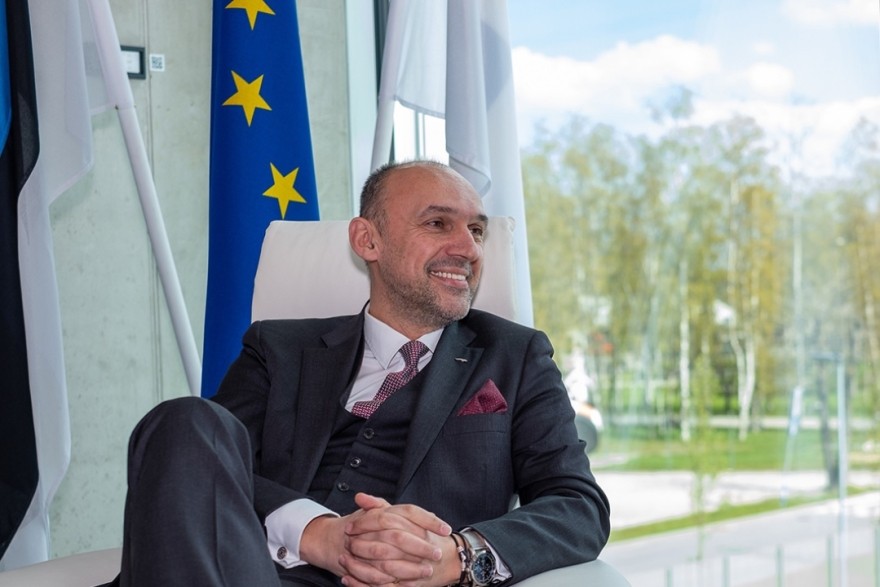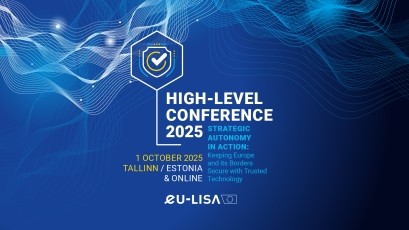Actions

Krum Garkov, head of the European Union Agency for the Operational Management of Large-Scale IT Systems in the Area of Freedom, Security and Justice (eu-LISA) pursues objectives based on principles that are more difficult to follow than they seem. Novel technological solutions, a changing agency, a strictly regulated legal area and teams in different countries raise the question of how it all works.
What is your focus and mission?
We are one of the agencies of the European Union that forms the basis of the Schengen area. Our services play a crucial role because without these Europe would not be what it is today. As a result, the work that I do is very exciting and provides many challenges.
Last year the mandate of the Agency was extended, so now we have more tasks to carry out. In addition, we are now accountable for the implementation of several large-scale projects. All new IT systems put in place will enhance the capabilities of border guards, the Migration Board and law enforcement and will transform the information architecture of the European Union in the coming years. That is my mission.
Another current focus is the transformation of the Agency, which is currently under way. Seven years ago, we started out as a small organisation with a total of 100 people and were accountable for three IT systems. Today, however, we are growing very quickly and by the end of 2020 the number of employees at the Agency is expected to be more than 400 people.
Our activities are significantly more ambitious, a trend that is set to continue, including also the services in the Agency's portfolio. The prerequisite for all this is the fundamental modernisation of the organisation, because the agency as it was formed years ago is no longer able to achieve the new objectives. The transformation of the Agency will include its structure, working processes, operational model, competency and rolling out new systems as well as updating their supporting features.
Obviously, you now have a very exciting and challenging role?
I do not know what the future will bring, but this role has so far been my greatest professional challenge. I have more than 25 years' experience of working in similar professions, more or less equally in both the public and private sectors. It is a coincidence that the IT agency is the fourth organisation that I've built from scratch. It is always interesting to compare experiences and I can confirm that right now is the most exciting time in my career.
Are speculations about computers replacing people at some point true, and does this affect the expansion of the Agency?
This does not apply in our agency and I think it does not apply in a more general way either. IT and new technologies are powerful but neutral – they are not designed to replace anyone or to do something more or better than people can. They are made to support people in different activities and to improve their lives.
I think the global trend of digital transformation will bring more efficiency in the way people work. We should not forget that IT, computers and artificial intelligence are invented by us. We therefore have the responsibility to make the best use of new technologies and capabilities, while making a clear difference between what IT can do and what a person can do. There is an ongoing discussion about drawing a line between a computer and a person, but no clear position has been reached. Replacing people is a discussion for the future, but right now that is a long way off.
Could you describe the Agency management as an international team?
The Agency has teams in its headquarters in Tallinn, in Strasbourg in France and in Brussels in Belgium. It is certainly not easy to manage teams in different countries because the geographical aspect has an impact on the arrangement of work. However, this does not limit efficiency as technical means can be used to organise work. There are, however, no substitutes for face-to-face communication, which is why many employees often travel between our offices. We combine different ways and means to keep the team together. This is very important because we are an organisation with a mission and objectives that we need to achieve as a team.
Based on your experience, what are the common mistakes that are made in managing international teams?
There are many things that can easily go wrong. The main issue is lack of transparency. All the members of an organisation need to understand what is being done and why. This is particularly important for teams working in different countries because there is a risk that everyone may not always have the same picture. Documented and comprehensive working procedures and processes are important as well. In order to correct and improve the work and to create success stories, feedback needs to be given. Feedback is also a tool for giving recognition and rewards.
In order to keep the team spirit alive, it is essential to communicate face to face, even via a video call. I also consider it important to provide people with opportunities for development. The Agency is a public organisation and we do not have unlimited career possibilities, but we can create opportunities for development. Our work is very interesting and has a direct impact on the people living in Europe. A good example is the fact that EU citizens now regard freedom of movement and no border checks as standard. Without the IT systems for which we are responsible, the Schengen area in its current form could not function and freedom of movement, one of the main principles of the EU, would not be possible.
How do you find the right people for the team in the current labour market situation?
This is indeed quite difficult. Our experience in the Agency has shown for a while that the situation in the labour market both in Estonia and in Europe as a whole is difficult. But the secret of success is not just about recruiting excellent people. We deal with IT operations and compete with private companies in the labour market. Of course, we cannot provide similar benefits and perhaps that is why we are not the most attractive choice for top talent, but we recruit people with potential and then invest in developing them. We have done this since the creation of the Agency and excellent talent has emerged from our staff. Developing talent is a way to cope with the situation in the labour market.
What do you think about Estonians as employees?
I have made some positive observations about Estonians working in our agency. Estonians are hard-working, dedicated and frank. At the beginning we had a small staff in Tallinn and half of them were Estonians. Estonians have therefore played a very important role in the establishment and development of the Agency. Today we have an international team; as an organisation of the European Union, we aim for our staff to be diverse and have people from different countries.
Is the diversity of the staff always a positive aspect?
On the one hand, a diverse team is a treasure because that way we can combine the experiences of different people which certainly benefits the organisation. On the other hand, cultural diversity is one of the greatest challenges that international managers have to face. People may, for example, interpret messages very differently depending on their cultural background and this needs to be taken into account in adjusting one's management style and communication. Otherwise the best of intentions may turn out to be a catastrophe.
What are the principles you follow when communicating with your teams?
Communication is one of the key elements that helps keep the organisation together and is at the same time one of the most important management tools. We have made strong efforts to do it right, and direct communication is a large part of my work. Communication should always serve a purpose and aim to convey a message. Cultural aspects have to be taken into account when communicating and this needs to be done regularly rather than on an occasional basis.
Communication requires preliminary work to be done in order to know your target audience. The staff of the Agency is one of our target audiences, whose needs I have to take into account as a manager. Our external target audiences have other interests that we need to be aware of in order to properly focus our communication. Whatever the field, a thorough analysis of the target audience is the foundation of successful communication – you need to know what to communicate and why and how to do it. In addition, the structure, frequency and consistency of communication is essential.
We have a comprehensive communication plan for both internal and external target audiences and a separate strategy for clarifying changes. Last year, a commitment survey among Agency staff showed that more than 80% of people were in favour of change. People understand why change is needed, what changes and how, the impact on them personally and what their path is within the renewed organisation. I personally update staff on any changes happening on a monthly basis, and so do other managers. Honesty is, of course, important, and should be kept in mind even in difficult situations.
Start-ups name a flat structure as one of the elements of their success. What do you think about this?
They are right, but a flat structure cannot be a lasting response to all management issues. A flat structure is appropriate for start-ups and smaller organisations because there is direct contact and ideas can be implemented quickly.
However, every organisation reaches a point in its development where such a structure no longer works. The organisation would then have to rebuild and restructure itself. We have been in this situation, because we initially had only two levels of management: me and my management team and the rest of the staff. However, with the growth and development of the organisation this model was no longer sustainable because otherwise managers would have around 50 people in their teams and that would be unmanageable. We decided to add levels of management and we currently operate with four. Creating management positions at a lower level will provide talented employees with an opportunity to develop and become a manager. Managers should embrace the idea that change and progress are always there and there is nothing of a lasting nature in an organisation.
How difficult is it to implement changes in a public sector organisation?
The activities of public sector organisations are strictly regulated, particularly in the light of EU institutions and that is why changes are indeed more difficult in that case. The rules we need to follow in our work are not particularly flexible or favourable for making changes. In the private sector, if the work of a person does not meet the needs and expectations of the position, that person's time in the organisation will be short-lived. However, the stability of the position is secured in a public organisation, which may, in certain cases, take the form of inefficiency in employees. We have to be very creative to make our resources work in the best possible way.
In addition to the fact that there is a shortage of labour in the technology sector, what other issues would you single out?
For one thing, cyber security. People increasingly connect through technology, but this makes us more vulnerable to people and countries with bad intentions. Technology is developing rapidly, and in order to keep up with innovation, the organisation needs to develop this ability and make the right decisions.
The lack of proper regulation is a concern. A good example of this is that legislation still lags behind innovation in the field of artificial intelligence and self-driving vehicles. This is also true for data protection because the power of technologies is in the data they collect. More and more data is personal and, when collecting data, companies have to follow increasingly stringent rules in accordance with the GDPR. Finding a balance is quite difficult here as this may enter into conflict with companies' business objectives.
Do you see yourself in the public or private sector in the future?
The good thing about future is that I do not know what it will bring. It is always interesting to work on something new and exciting. I am confident that I will continue my role as senior manager but whether that will be in the public or private sector is yet to be seen. As my mandate ends in 2023, I will be with the Agency for four more years. So, I have time to think about what to do next!
Garkov's CV
Krum Garkov has been the head of eu-LISA since the end of 2012. Before that he was the managing director of Experian Group Ltd, programme manager at Hewlett-Packard and worked in the National Revenue Agency of the Republic of Bulgaria and in the Privatisation Agency.
He has a master's degree in computer technology from Varna University and a master's degree in information systems from the Stevens Institute of Technology in New Jersey. He has also graduated from the London Business School in the field of management consulting.
The European Union Agency for the Operational Management of Large-Scale IT Systems in the Area of Freedom, Security and Justice (eu-LISA) started its work in 2012, leading and developing the EU's large-scale IT systems in the area of internal security and managing communication infrastructure. The Agency manages the Schengen Information System (SIS), Visa Information System (VIS) and Eurodac, the fingerprints database for asylum applicants.
It is headquartered in Tallinn and has data centres in Strasbourg in France and in Sankt Johann im Pongau in Austria.
Credits
- Interviewer: Kadri Kütt for Ajakiri Director
- Photo: Aigar Lusti
- Translated from Estonian by: Translation Centre For the Bodies of the EU
- Estonian Version: Eduka organisatsiooni juht teab, et areng ei lõpe kunagi


